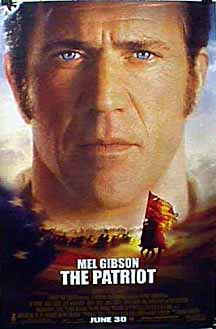 |
 |
 |
 |
July 10, 2000 |
|||||||||||||||||||||||||||||||||||||||||||||||
|
THE PATRIOT |
|
|||||||||||||||||||||||||||||||||||||||||||||||
|
The time is 1776, and the place is South Carolina. Benjamin Martin (Mel Gibson) is a veteran of the French and Indian War, and is a widower with seven children. His eldest, Gabriel (Heath Ledger) goes against his father's wishes, and enlists in the Continental Army. The rebellion, although started in the North, has heated up in the South, and it will be difficult for war-weary Benjamin to remain neutral. Indeed, a battle unfolds on their property, and their house becomes a makeshift hospital for British and American soldiers alike. Arriving only the night before, a wounded Gabriel gets bandaged up and is about to head back to his unit, but is identified as a rebel by brutal Colonel William Tavington (Jason Isaacs), leader of the Green Dragoons. Tavington arrests him, and shoots Gabriel's younger brother Thomas (Gregory Smith) in the process. He also orders all the rebel wounded killed. Filled with a desire for vengeance, Benjamin grabs some guns and a tomahawk, arms two of his younger sons, and sets off to ambush the squad of soldiers escorting Gabriel to the gallows. In an amazing sequence, the Martin group dispatches the Brits, and frees Gabriel. Realizing that he has to get involved beyond a personal vendetta, Benjamin deposits the children with his sister-in-law Charlotte (Joely Richardson), and meets up with Colonel Harry Burwell (Chris Cooper). The elder Martin is given a field commission as colonel, and organizes a militia, that includes a priest (Rene Auberjonois), a slave (Leon Rippy), and Gabriel. After carrying out a series of brilliant and successful guerilla attacks, the militia is decimated by Tavington, who takes many prisoners, set for immediate execution. Using deception, the prisoners are freed, and now the relatively mild Cornwallis (Tom Wilkinson) unleashes Tavington to the fullest, to capture this "Ghost" (Martin's nickname). Hundreds of innocent civilians are killed as Tavington creates a reign of terror. In a battle meant to be Cowpens, the British (and Tavington) suffer a humiliating defeat, leading up to their ultimate surrender at Yorktown, on October 19, 1781. Critical reaction to this pic, with some notable exceptions, has been odd. There are those who dislike it because of its historical accuracy! That the patriots are portrayed as religious "gun nuts," is hard for the PC crowd to swallow--likewise the notion of teenagers in combat. Others decry the one dimensional evil of Tavington. Tavington is based on Colonel Banastre Tarleton, and if anything, the film understates his thirst for blood. The main reason why this character does not go under his true name is that Tarleton did not die in the war. He returned to England and lived a long and prosperous life, despite his fearsome reputation and defeats at Cowpens and Blackstock. Yes, he actually did wear a bearskin hat, as does Tavington. The real Cornwallis was against harsh measures toward the colonists, but saw his duty to King George III. If he was repulsed by the actions of Tarleton, he refused to accept his resignation after Cowpens. All in all, the American experience helped him deal with rebellions in Ireland and India later in his career. The Benjamin Martin character is a composite of Daniel Morgan, Francis "Swamp Fox" Marion, Elijah Clark, Thomas Sumter, and Andrew Pickens. Those who insist that Benjamin Martin equals Francis Marion, now newly labeled a "racist," betray an appalling ignorance of American history. Since the movie centers on conflicts involving Tarleton, Morgan and Sumter would head that list, with Morgan most memorable as the brains behind the victory at Cowpens. Some naysayers even discount the portrayals of Blacks, apparently forgetting that Washington promised freedom and pay for all men of that race who join the army or militia, and complete a year of service. It is far easier, I suppose, to believe the monolithic evil slave master cliché. Never mind that slavery was legal in Massachusetts until 1835, and that only a small fraction of Southerners even owned slaves. Ignore, as well, that harming a very expensive asset such as a slave, as a matter of course, would be ridiculous. And now we come to the most bitter pill for all members of the Liberal establishment: America's War of Independence was most assuredly won in the South, and a good deal of our cherished Constitution was framed by Southerners. Thus, they cannot identify with the very source of their endlessly touted freedoms, and are thrust into permanent inner conflict. But our modern day elitists are 225 years separated from the Revolution, and are the products of a biased history of the Civil War era. What excuse should we proffer for their predecessors in the mid 19th century, who were only too willing to slander and eventually kill their brethren?
|
|
|
|
|
Last Update:
|

 One
of the best war movies ever made, and certainly the finest cinematic
representation of the American War of Independence.
One
of the best war movies ever made, and certainly the finest cinematic
representation of the American War of Independence.
